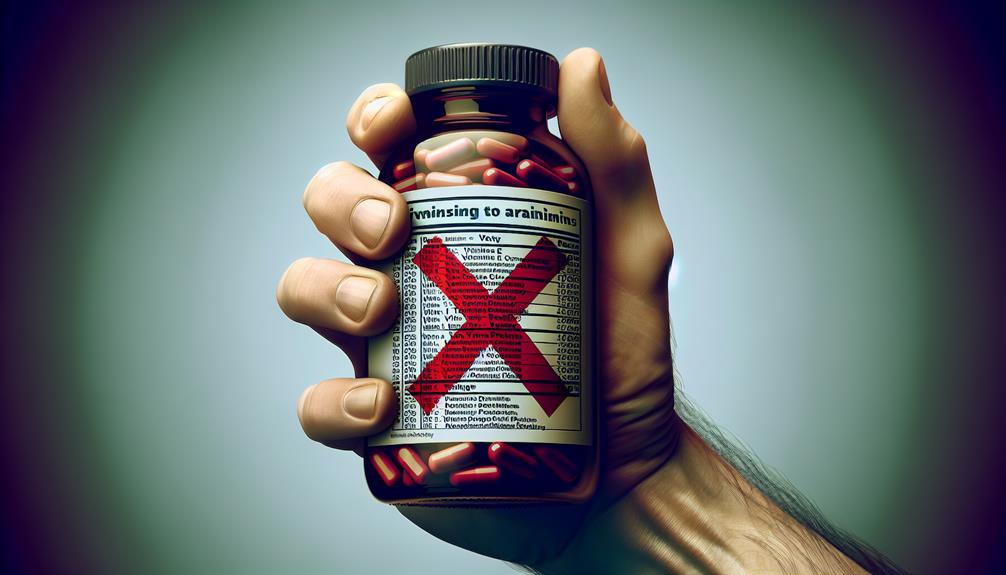
To lower blood sugar naturally with supplements, consider Alpha-Lipoic Acid for insulin sensitivity. Try Cinnamon to mimic insulin and boost glucose uptake. Chromium aids carbohydrate metabolism, and Berberine enhances insulin sensitivity. Consult healthcare providers for personalized dosages and timing. Take Alpha-lipoic acid with meals for better absorption, and Cinnamon with meals for efficacy. Watch for side effects like digestive issues or hypoglycemia. Safely manage blood sugar levels by monitoring and seeking professional guidance. Understanding these supplements' roles is key to managing blood sugar naturally.
Key Takeaways
- Consider supplements like ALA, cinnamon, and chromium for blood sugar control.
- Consult healthcare providers for personalized dosages and timing recommendations.
- Watch for side effects like digestive issues or hypoglycemia when using supplements.
- Take supplements with meals for optimal absorption and effectiveness.
- Choosing quality supplements is essential for managing blood sugar levels safely.
Importance of Blood Sugar Regulation
Maintaining optimal blood sugar levels is crucial for overall health and well-being. When your blood sugar levels are within a healthy range, your body functions more efficiently. Glucose, which comes from the food you eat, serves as the main source of energy for your cells. Insulin, a hormone produced by the pancreas, helps regulate the amount of glucose in your blood. When blood sugar levels are too high or too low, it can lead to serious health complications.
High blood sugar levels, also known as hyperglycemia, can cause symptoms like increased thirst, frequent urination, fatigue, and blurred vision. Chronic hyperglycemia can damage blood vessels and organs over time, leading to complications such as heart disease, kidney disease, and nerve damage.
On the other hand, low blood sugar levels, or hypoglycemia, can result in symptoms like shakiness, sweating, confusion, and even loss of consciousness. Proper blood sugar regulation is essential for preventing these health issues and maintaining overall well-being.
Common Causes of High Blood Sugar
High blood sugar, or hyperglycemia, can be caused by various factors including dietary choices, lack of physical activity, and certain medical conditions. When you consume high amounts of sugary or carbohydrate-rich foods, your blood sugar levels can spike, especially if your body has difficulty processing these sugars efficiently. Additionally, a sedentary lifestyle can lead to insulin resistance, where your cells are less responsive to insulin, resulting in elevated blood sugar levels. Medical conditions such as diabetes, thyroid disorders, and certain medications can also contribute to high blood sugar.
Furthermore, stress plays a role in blood sugar regulation. During stressful situations, your body releases hormones like cortisol and glucagon, which can cause blood sugar levels to rise. Lack of sleep and poor sleep quality have also been linked to higher blood sugar levels. By understanding these common causes of high blood sugar, you can make informed choices to help regulate your blood sugar levels effectively and maintain overall health.

Top Supplements for Blood Sugar Control
Supplements have shown promising potential in aiding blood sugar control through various mechanisms. When considering supplements for blood sugar management, it's essential to choose those with scientifically proven benefits. Here are the top supplements known for their positive effects on blood sugar levels:
- Alpha-Lipoic Acid (ALA):
- ALA is an antioxidant that has been shown to improve insulin sensitivity and reduce blood sugar levels. It may also help reduce symptoms of diabetic neuropathy.
- Cinnamon:
- Cinnamon contains compounds that can mimic insulin and improve glucose uptake by cells. Studies suggest that cinnamon supplementation may lower fasting blood sugar levels.
- Chromium:
- Chromium is a mineral that plays a crucial role in carbohydrate and lipid metabolism. Supplementing with chromium has been linked to improved insulin sensitivity and reduced blood sugar levels in individuals with diabetes.
Choosing the right supplements, in conjunction with a healthy diet and lifestyle, can be a valuable strategy for managing blood sugar levels effectively.
Recommended Dosages and Timing
When considering the recommended dosages and timing for supplements aimed at blood sugar control, it's crucial to consult with a healthcare provider or a qualified professional for personalized guidance based on individual health needs and conditions. The recommended dosages of supplements can vary depending on factors such as age, weight, existing health conditions, and the specific supplement being used. Timing of supplement intake is also important as it can affect absorption and effectiveness.
For example, alpha-lipoic acid is commonly taken in doses ranging from 300 to 1800 mg per day, divided into two or three doses with meals to enhance absorption. Similarly, cinnamon supplements are often recommended at doses of 500 mg twice a day with meals. Berberine dosages typically range from 900 to 1500 mg per day, divided into three doses before meals.
To maximize the benefits of these supplements for blood sugar control, it's essential to follow the recommended dosages and timing provided by your healthcare provider or a qualified professional.
Potential Side Effects to Watch For
Considering the potential side effects of blood sugar control supplements is crucial for ensuring safe and effective usage. While these supplements can offer benefits, it's important to be aware of possible adverse reactions that may occur. Here are some potential side effects to watch for:

- Digestive Issues: Some individuals may experience gastrointestinal discomfort such as bloating, gas, or diarrhea when taking certain blood sugar control supplements.
- Hypoglycemia: In some cases, blood sugar control supplements can lower blood sugar levels too much, leading to hypoglycemia. Symptoms of hypoglycemia include shakiness, sweating, confusion, and dizziness.
- Allergic Reactions: Allergic responses to supplements are possible and may manifest as itching, swelling, rash, or difficulty breathing. If you experience any allergic symptoms, discontinue use and seek medical attention promptly.
Monitoring for these potential side effects and seeking guidance from a healthcare professional can help ensure the safe and effective use of blood sugar control supplements.
Tips for Monitoring Blood Sugar Levels
To effectively monitor your blood sugar levels, it's essential to establish a consistent routine of testing at specific times throughout the day. Monitoring your blood sugar levels can provide valuable insights into how your body processes glucose and help you make informed decisions about your diet and lifestyle.
One key tip is to test your blood sugar levels before meals to understand how your body responds to different foods. Additionally, testing after meals can show how well your body is able to regulate blood sugar spikes. Keeping a log of your blood sugar readings along with notes about your meals and activities can help identify patterns and trends.
It's also recommended to have regular check-ups with your healthcare provider to review your monitoring routine and make any necessary adjustments. By staying proactive and consistent with your blood sugar monitoring, you can better manage your levels and promote overall health and well-being.
Conclusion
In conclusion, maintaining healthy blood sugar levels is essential for overall well-being. By incorporating supplements such as chromium, berberine, and cinnamon into your daily routine, you can naturally lower blood sugar levels and reduce the risk of complications associated with high blood sugar.
Remember to consult with your healthcare provider before starting any new supplement regimen, and regularly monitor your blood sugar levels to ensure optimal control. Stay proactive in managing your health to live a thriving and balanced life.





